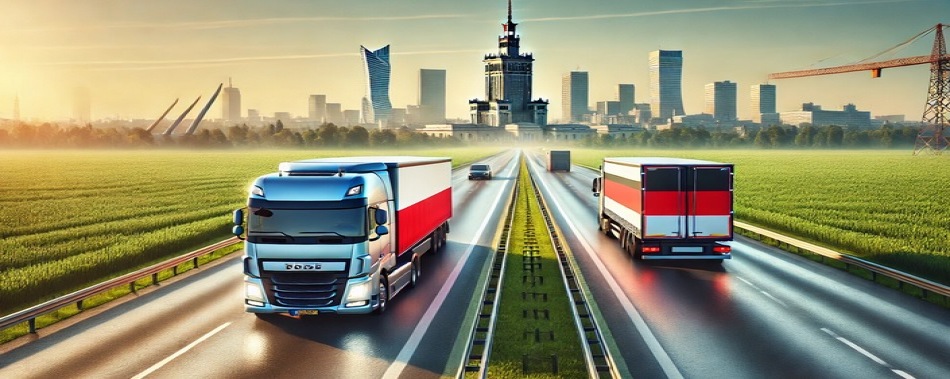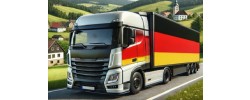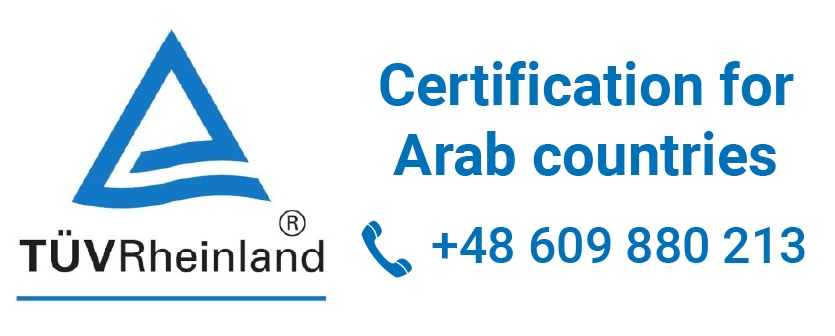Transport to Germany. International Transport to Germany
Transport of goods between Poland and Germany is one of the most rapidly developing segments of transport in Europe, which results from the high level of trade between the two countries. Germany is Poland's largest trading partner, and Poland is one of the main suppliers of goods to the German market. In 2023, freight transport in this relationship increased by 8.5% compared to the previous year, demonstrating the dynamic growth of the sector. It is worth noting that road transport dominates this exchange, accounting for approximately 80% of shipments. Additionally, rail transport, although still smaller, is gaining in importance, especially in the context of rising road transport costs and ecological trends in logistics.
Transport companies perform freight transport to Germany, generating revenues of approximately 150-160 million PLN annually. In the case of transport from Germany to Poland, this turnover amounts to about 222,124.8 million PLN.
Data shows that in 2022, more than 10 million tons of road freight were transported from Poland to Germany, while exports from Germany to Poland amounted to nearly 9 million tons. The main goods transported in this relationship are machines, mechanical devices, chemicals, and food products. Furthermore, due to the rapid growth of e-commerce, shipments related to online trade are increasing by several percent annually. Maritime transport between Poland and Germany has a smaller share, but the ports in Gdańsk, Gdynia, and Szczecin regularly handle container and freight transport on routes to and from Germany.
The main means of transport for goods to Germany are road and rail transport, due to direct access to the highway and railway networks that connect Poland with Germany. Road freight transport is carried out both by trucks and trailers and containers. This is the most commonly chosen form of transport due to its flexibility, allowing goods to be delivered directly to their destination, both in large cities and smaller towns. Additionally, road transport is characterized by relatively fast execution times, which is crucial for goods requiring efficient distribution. The value of exports of goods by land to Germany continues to grow, and these shipments account for a significant portion of total international transport from Poland.
Another important segment of freight transport is rail transport. Thanks to the developed network of railway lines and good integration of transport systems within the European Union, rail transport of goods to Germany is becoming increasingly popular. Rail shipments are advantageous for large loads that require transport over long distances. Rail transport also has lower operating costs compared to road transport, which can be a significant advantage for bulky goods. Bulk goods, such as industrial raw materials, fuels, or machine parts, are primarily transported to Germany, which require secure and stable transport.
Since Germany is one of the main recipients of Polish agricultural and food products, the transport of these goods is another important segment of trade. For food products such as meat, vegetables, and fruits, key standards regarding quality, safety, and freshness must be followed during transport. These products are often transported under controlled temperatures, which requires the use of appropriate refrigerated vehicles. As a result, the transport of food products to Germany involves high logistical and sanitary requirements, as well as the need to comply with strict EU regulations.
Thanks to strong logistics infrastructure, including both highways and modern distribution centers in Poland and Germany, freight transport between these countries is carried out efficiently and optimally in terms of cost and time. Poland also has several inland ports that enable the transport of goods by waterways, although maritime transport is not the primary means of transport to Germany. Ports such as those in Gdańsk and Szczecin serve as gateways for goods transported by international waters, but also for goods that are then transported to Germany by land.
The freight transport market to Germany is also burdened with challenges related to increasing competition and changing legal regulations within the European Union. On one hand, competition among transport companies affects the reduction of service prices, which can benefit customers, but on the other hand, rising fuel and fleet maintenance costs can lead to higher transport prices. Additionally, changes in regulations regarding emission standards and ecology pose a challenge for transport companies, which must adapt their fleets to environmental requirements, which involves investing in modern, low-emission vehicles.
Polish freight transport to Germany is becoming more diversified, with growing interest in modern logistical solutions such as intermodal transport, which combines different means of transport, e.g., rail and road transport. With such organization of shipments, it is possible to reduce costs, shorten transport time, and reduce environmental impact. Intermodal transport is particularly effective in the case of large and heavy loads that require long-distance transport.
Year by year, the demand for freight transport services offering flexibility and fast delivery is also increasing. Customer expectations regarding timeliness and service quality are becoming higher, which is causing Polish transport companies to invest in modern fleet management technologies that allow for route optimization, real-time vehicle monitoring, and automation of logistical processes. All these factors contribute to the further development of the transport market to Germany and increase the competitiveness of Polish transport companies in international markets.
Transport to Germany is one of the most frequently chosen logistics services due to geographical proximity and strong trade ties between Poland and Germany. Germany is Poland's main economic partner, and transport between Poland and Germany plays a key role in trade exchange. Every day, thousands of vehicles carry out transport in the Poland-Germany route, transporting various types of cargo – from industrial goods to food products and specialized shipments. Thanks to well-developed infrastructure and a wide range of transport companies, shipments on this route are fast, safe, and efficient.
Organizing transport to Germany is not complicated, but it is extremely important to choose the right means of transport. Road transport is the most popular choice, as it allows direct and flexible "door-to-door" delivery. The main transport routes between Poland and Germany pass through the highway network, which allows for quick travel even over long distances. For larger loads, the alternative is rail or maritime transport, especially using German ports such as Hamburg or Bremen.
Transport to Germany also includes the handling of specialized and non-standard goods. Logistics tailored to industries with specific requirements, such as the automotive industry, the food sector, or pharmaceuticals, plays a significant role here. In the transport between Germany and Poland, delicate materials that require special care and proper security are also transported. High-quality fleets of vehicles equipped with modern GPS monitoring systems and temperature control ensure timely deliveries and safety. As a result, transport from Poland to Germany meets the requirements of even the most demanding clients, ensuring reliability in delivering goods to every corner of Germany.
When planning transport to Germany, it is worth remembering the formalities. Thanks to both Poland and Germany being members of the European Union, customs procedures are simplified, significantly speeding up the transport process. For specific loads, such as alcohol, medical products, or oversized goods, additional permits may be required. Companies specializing in transport to Germany offer support in preparing documentation and organizing the entire logistical process, minimizing the risk of delays.
The costs of transport between Poland and Germany depend on several factors, such as the type of cargo, distance, chosen means of transport, and the delivery deadline. Thanks to the large number of companies operating in this market, customers have access to competitive offers and high-quality services. Regular shipments within the Poland-Germany transport route allow companies to obtain attractive cooperation terms, which translates into cost optimization and improved logistical processes.
Transport to Germany is also an ideal solution for individual customers planning an international relocation or needing to transport goods of unusual dimensions. Transport services include loading, unloading, and proper protection of goods, ensuring that the entire process runs smoothly and without problems.
Taking all the above into account, transport to Germany plays a key role in international logistics. Both transport from Poland to Germany and transport in the Germany-Poland direction form the foundation of trade exchange between the two countries. Choosing an experienced carrier guarantees timeliness, safety, and comprehensive service at every stage of order fulfillment.

 pl
pl  en
en  de
de  es
es  fr
fr  it
it  pt
pt  ru
ru  sv
sv 
















